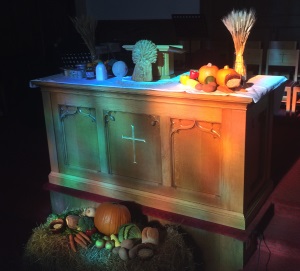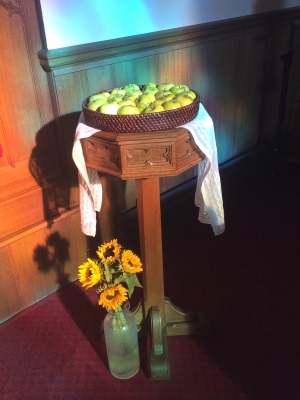Isaiah 5:8-10 is the Scriptural basis for Rev. Geoff McKee’s sermon of 09 October 2016 (Harvest Thanksgiving). Geoff’s discussion includes ideas as to how Christians should respond to global warming and ecological injustice. The Old Testament passage from Isaiah follows immediately below and then Geoff’s sermon. You can also download the sermon as a PDF by clicking here.
Note that, in the following Scripture: a “bath” is about 6 gallons or about 22 litres; a “homer” is probably about 360 lb or about 160 kg; and an “ephah” is probably about 36 lb or about 16 kg.
Isaiah 5:8-10 (New International Version)
Woes and Judgments
8 Woe to you who add house to house
and join field to field
till no space is left
and you live alone in the land.
9 The Lord Almighty has declared in my hearing:“Surely the great houses will become desolate,
the fine mansions left without occupants.
10 A ten-acre vineyard will produce only a bath of wine;
a homer of seed will yield only an ephah of grain.”
The world media picked up on an interesting spat between the well known physicist Brian Cox and a newly elected Australian senator on Australian television in August.
The Guardian reported the confrontation as follows:
“The celebrity physicist Brian Cox came prepared to the ABC’s Q&A on Monday night with graphs, ready to counter claims by his co-panellist, the climate denier and Australian senator-elect, Malcolm Roberts.
Roberts, one of four senators elected from Pauline Hanson’s One Nation party, took the first opportunity to espouse long-refuted climate-denialist claims, including that warming stopped more than 20 years ago, starting the so-called “hiatus” or “pause”.
But Cox produced a graph of global surface temperatures of the past century and immediately debunked the myth, pointing out it is a misunderstanding caused by looking at a small sample, starting from an unusually warm year two decades ago.
Cox didn’t stop there. “Also, secondly, I’ve brought another graph. It is correlated with that, which is the graph that shows the CO2 emissions parts per million.”
Viewers on Twitter joined in. When Roberts argued that sea level rises had been “entirely natural and normal”, a number of people posted graphs showing the steep rises.
Roberts repeatedly said he wanted to see “the empirical data”. But when the data appeared to refute what he said, he argued that scientists had conspired to manipulate it.”
 There will always be people who refuse to accept that the world around them is changing.
There will always be people who refuse to accept that the world around them is changing.
Among these sceptics there will be some who will deny that humankind – and its behaviour – has got anything to do alarming extremes like drought, flooding, soaring temperatures, crop failures and so on.
Biblical writers did not suffer from such blindness.
They consistently viewed environmental disasters as the consequence of human corruption and injustice, and the failure to worship God as the generous creator of the earth.
The great flood described in Genesis was seen by the authors of Genesis as the judgement of God on those who had turned the earth into a violent and wicked place. But, while the people were so wretched that God virtually wiped them out, God saved the animals, birds and creeping things through the device of Noah’s Ark. Once the flood receded they, along with the descendants of Noah, were invited in the covenant God declared to ‘abound on the earth and be fruitful and multiply’ (Gen. 8. 17).
The ancient story teaches us that the earth suffers ecologically when human injustice abounds.
The story also teaches us, however, that God desires to redeem all of life from sin, and not just humankind.
Like the authors of Genesis, the Hebrew Prophets also identified a connection between ecological disaster and human sin and injustice.
Isaiah argued that economic injustice, and especially the greed of rich landowners who dispossessed small farmers, was responsible for the declining fertility of the soil and the ruin of farms both small and large.
The prophets point to the cosmic nature of the covenant between God and the people of God. The covenant community embraced humans and non-humans, and the land itself, in a complex web of relational connections between humanity. It created order, which humans neglected at their peril.
When the people of Israel worshipped God as their sovereign Lord, and modelled their lives after God’s righteousness, the land and all its inhabitants prospered.
But when the people:
- neglected the covenant,
- worshipped that which was not the just and holy God, and
- where some grew wealthy and acquired great parcels of land, while others languished in poverty,
then the land itself turned to desert and its non-human inhabitants also suffered.
As Isaiah put it (Isaiah 24:5-6):
‘the earth is mourning, withering, the heavens are pining away with the earth. The earth is defiled under its inhabitants’ feet, for they have transgressed the law, violated the precept, broken the everlasting covenant. So a curse consumes the earth and its inhabitants suffer their penalty.’
In the times of Israel, it was kings and wealthy landowners who oppressed the people and brought about ecological destruction as they destroyed forests and over-tilled the soil to serve their greed for greater wealth.
In our own time, it is giant multinational corporations – which drive forward the expansion of global trade – who are responsible for so much ecological destruction in both North and South.
It is also corporate influence and lobbying which has seen to it that nothing effective has been done to reduce natural resource consumption in the rich North or to eradicate poverty in the South.
When we celebrate the Sacrament of Holy Communion we not only recall the death of the Lord Jesus until he comes again, but also anticipate the great reversal of the messianic feast when God will ‘fill the hungry with good things while the rich will be sent empty away’ (Luke 1:53).
Bread and wine are staple foods in the Middle East and their transformation as the sacrament of the presence of Christ connects every Christian gathering around the Lord’s Table with the good earth, and with local agriculturalists and purveyors of food.
The increasingly global character of the food economy is a major promoter of human and ecological injustice and of climate change.
When giant food corporations purloin forests and agricultural lands for growing feed crops for Northern-produced meat, or tropical fruits for Northern tables, they both disrupt the food security of poor communities in the South and, at the same time, threaten local biodiversity as these communities are forced to grow their own food on marginal lands such as hillsides, wetlands or by slashing and burning forests in the wake of the logging companies.
The ecological costs of flying all this food from South to North, and of freighting food between the US and Europe and between European countries, are immense. Air travel is a major source of greenhouse gases, and the ‘need’ for onward transport of all this globally-traded food across North America and Europe is a major source of the constant pressure from the road haulage lobby to expand the motorway network.
When we see the relationship of the sacrament and the food economy, we remind ourselves of the connections between our own consumption of food and global ecological and justice issues.
Food, along with housing, is for most households the largest weekly expense.
If we choose to use our money to seek out local food suppliers, whether farmers’ markets, organic boxes or produce which is clearly labelled as locally grown, we are making a choice which has tremendous potential for ecological change. Buying locally grown food, or growing food on allotments or in back gardens, where we have access to them, are significant means by which we can begin to reverse the ecologically destructive tide of globalisation through local actions.
Christians break bread in recognition that the death and Resurrection of Christ represent the defeat of the Powers and that the peace of creation and the reign of God are already breaking in as they meet together around the Lord’s Table. And the Sacrament, with its echoes in other acts of eating and food production, already anticipates the praise of all peoples that the Psalmists declared would be offered to God by all of life on earth as well as all its peoples at the end of time.
The governments of the rich may promote the interests of corporations before people and planet.
But when local worshipping communities reconnect the celebration of Holy Communion with ecological justice and the food economy they announce that the corporate corruption of politics, and the corporate destruction of natural resources, can be hopefully resisted.
And they give visible shape to the good news that the trouncing of the Powers that threaten life on earth by the cross and resurrection of Jesus Christ is not only a past event but one that is constantly breaking into our present reality – and, especially, when Christians break bread together.
This Harvest time we insist on these connections between Holy Communion and ecological justice.
We resist the temptation to write the creation off as spent and peripheral and, instead, bring our concern and our active response to the core of our worship.
Note: The images accompanying this post were taken after our Harvest Thanksgiving service on 09 October 2016, with the various objects bathed in multi-coloured sunlight through the main stained glass window.

